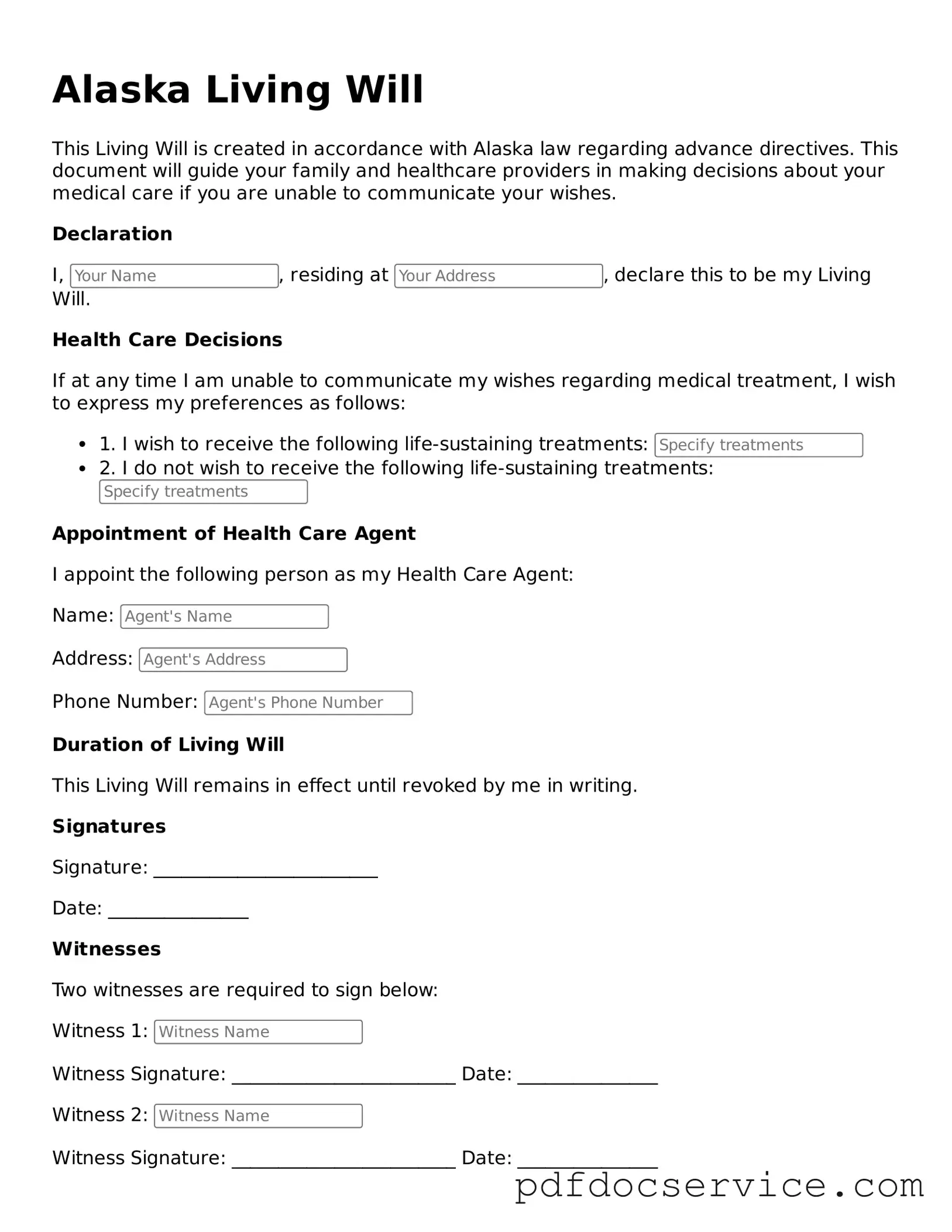What is a Living Will in Alaska?
A Living Will is a legal document that outlines an individual's preferences regarding medical treatment in situations where they are unable to communicate their wishes. In Alaska, this document specifically addresses end-of-life care and can guide healthcare providers and family members in making decisions that align with the individual’s values and desires.
Who should consider creating a Living Will?
Anyone over the age of 18 should consider creating a Living Will, especially those with specific health concerns or individuals who wish to ensure their medical preferences are respected. This document is particularly important for individuals with chronic illnesses, those undergoing significant medical procedures, or anyone wanting to clarify their wishes regarding life-sustaining treatments.
What are the key components of an Alaska Living Will?
An Alaska Living Will typically includes:
-
Identification of the individual creating the document.
-
Specific instructions regarding medical treatments, such as resuscitation, mechanical ventilation, and feeding tubes.
-
Conditions under which these instructions apply, often focusing on terminal illness or irreversible conditions.
-
Signature and date, which may require witnesses or notarization depending on state requirements.
How does a Living Will differ from a Durable Power of Attorney for Healthcare?
A Living Will focuses specifically on medical treatment preferences, while a Durable Power of Attorney for Healthcare appoints an individual to make healthcare decisions on behalf of another person. While both documents are essential for comprehensive healthcare planning, they serve different purposes. The Living Will provides direct instructions, whereas the Durable Power of Attorney allows for flexibility in decision-making based on the circumstances at hand.
Can I change or revoke my Living Will?
Yes, individuals have the right to change or revoke their Living Will at any time, as long as they are mentally competent. To make changes, it is advisable to create a new document and clearly indicate the revocation of any previous Living Wills. Informing family members and healthcare providers about the changes is also crucial to ensure that your current wishes are known and respected.
Is a Living Will legally binding in Alaska?
Yes, a properly executed Living Will is legally binding in Alaska, provided it meets the state’s requirements. It is essential to follow the correct procedures for signing and witnessing the document to ensure its validity. Healthcare providers are obligated to follow the instructions outlined in a valid Living Will, as long as they are consistent with state laws.
How can I ensure my Living Will is respected by healthcare providers?
To ensure your Living Will is respected, consider the following steps:
-
Provide copies to your healthcare providers and discuss your wishes with them.
-
Share the document with family members and close friends to foster understanding and support.
-
Keep the original document in a safe yet accessible location.
-
Review and update the document regularly, especially after major life changes.
Alaska Living Will forms can be obtained from various sources, including:
-
Legal websites that offer templates for state-specific Living Wills.
-
Healthcare facilities or hospitals, which may provide forms and guidance.
-
Legal professionals who specialize in estate planning or elder law.
It is advisable to consult with a legal professional to ensure that the form meets all necessary legal requirements and accurately reflects your wishes.
What should I do after completing my Living Will?
Once your Living Will is completed, take the following steps:
-
Sign and date the document, ensuring it is witnessed or notarized if required.
-
Distribute copies to your healthcare provider, family members, and anyone else involved in your healthcare decisions.
-
Store the original document in a safe place where it can be easily accessed when needed.
-
Review the document periodically to ensure it still reflects your wishes.
By taking these steps, you can help ensure that your healthcare preferences are honored when it matters most.

